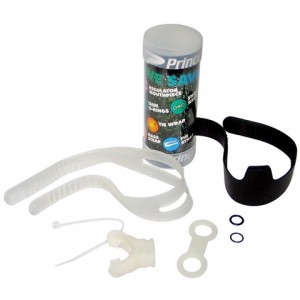
When should I use Nitrox?
When should I use Nitrox?
If your planning a dive where you want as much bottom time as you can get, then consider Nitrox gas mixture diving or Nitrox Diving, by breathing less nitrogen your body is less saturated and you are able to stay down longer.
What is Nitrox?
It’s enriched air with a higher percentage of oxygen and a lower percentage of nitrogen than the normal atmosphere. By reducing the amount of nitrogen in breathing gas, there is less to dissolve in our bloodstream for an equal time at a given depth. This translates into more bottom time with an additional benefit: a significant reduction of the effects of nitrogen narcosis.
Depending on the mixture, Nitrox can allow you as much as 50% more bottom time than the same dive with air.
Other advantages are shorter surface intervals due to less outgassing required and, at the end of a busy diving day, you’ll actually feel less fatigued due to the reduced physiological effort required to outgas. Another bonus that many Nitrox divers report is generally reduced air consumption, further adding to bottom time.
Nitrox diving is simple, beneficial, and most importantly, safer than diving on regular air. This is especially true in places like Cocos Island, where the diving profile is moderately deep and where, due to the excitement of the experience, divers have a tendency to stretch the limits of diving on air.
In order to maximize your enjoyment and optimize your depth for each particular dive-site, the actual dive profile selection chosen by our dive masters is based on the Nitrox mixture used.
Even if you aren’t interested in extending your bottom time, don’t forget about the extra margin of safety allotted by breathing a gas that has less nitrogen in it, nitrogen being the inert gas in air that is responsible for most decompression illness.
To breathe a sigh of relief knowing that you’re protecting yourself that much more. And most divers report that they feel less tired after a dive on Nitrox versus a dive on air due to the added oxygen in the air you are breathing. After 3-4 dives on a liveaboard vacation, that extra energy is pretty nice. “When should I use Nitrox” like always!!
What’s in a Name? (article from scubadiving.com)
Nitrox is the general name for any breathing gas with an oxygen content higher than the 21 percent found in air. By upping the oxygen in a diver’s tank (recreational nitrox blends contain between 28 percent and 40 percent oxygen — the most popular blends are 32 percent and 36 percent), you reduce the amount of nitrogen and therefore extend bottom times with the same nitrogen exposure as breathing air.
It’s a simple idea and it works — at moderate diving depths. The myth that nitrox lets you dive deeper, however, is a dangerous misconception. The problem comes from the fact that oxygen, while vital to keeping divers alive, can become toxic at high pressures. It’s a classic case of too much of a good thing.
Too much oxygen at pressure attacks the central nervous system, causing convulsions or seizures, visual distortions, ringing ears, nausea, twitching, irritability and dizziness.
These symptoms occur when the bloodstream is overloaded with oxygen. The oxygen not required for metabolism remains bonded to the hemoglobin or circulates as dissolved gas in the bloodstream. Supersaturated with oxygen, hemoglobin can’t transport carbon dioxide to the lungs. As the carbon dioxide and oxygen build up, blood vessels constrict, reducing blood flow to the brain and eventually interfering with the neuromuscular conductors.
Oxygen toxicity hits are very rare in diving, but if they happen under water, they happen fast and are likely to be fatal. Convulsive muscle contractions can lead to embolisms and loss of the regulator can lead to drowning. That’s why certified nitrox divers learn to calculate and manage their oxygen exposure.
So always remember it will keep you safe as long as you dont abuse it.
Thanks, from Greg and all of us at Scuba happy, and Safe Diving
